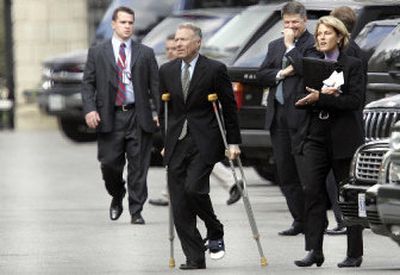Rove, Libby prepare for the worst

WASHINGTON – The White House, district court officials and two possible targets of the CIA leak investigation were making preparations Thursday for the possible announcement of indictments by special counsel Patrick J. Fitzgerald today, according to several sources familiar with the investigation.
Two sources said I. Lewis “Scooter” Libby, Vice President Dick Cheney’s chief of staff, was shopping for a white-collar criminal lawyer and White House Deputy Chief of Staff Karl Rove had begun assembling a public relations team in the event they are indicted.
At the White House, aides scrambled to put the finishing touches on a political strategy to respond to the fallout from any criminal charges, including the likelihood of staff changes. A Republican consultant with close White House ties said Chief of Staff Andrew H. Card Jr. had canceled at least two trips in the past week and met with Bush over the weekend to focus on how to react to the grand jury’s decisions.
“These will be very, very dark days for the White House,” the consultant quoted Card as saying.
At the U.S. District Courthouse on Constitution Avenue, where Fitzgerald will meet with the grand jury for what is expected to be the final time, there was a rush of activity. Court staff made preparations to quickly produce scores of copies of documents for waiting reporters.
Still, the penultimate day of the 22-month probe ended with the same mystery that has kept much of Washington, including some of the possible targets and lawyers in the case, on edge about Fitzgerald’s plans.
The special counsel set out in late 2003 to investigate whether anyone in the Bush administration illegally disclosed the identity of CIA operative Valerie Plame as part of an effort to discredit her husband, Joseph C. Wilson IV, an outspoken Iraq war critic and former ambassador.
But officials close to Rove and Libby said the two high-level aides seem more concerned about being charged with making false statements to the grand jury, an area Fitzgerald has shown great interest in as the case comes to a close. People close to Rove said the senior Bush strategist and his legal team have worked assiduously in the past week to convince Fitzgerald that Rove did not mislead the grand jury.
Fitzgerald has a number of legal options. They range from concluding that no one broke the law to charging a number of government officials with a conspiracy to unmask Plame or obstruct justice during the investigation. But it was hard to find anyone involved in the case Thursday who believed Fitzgerald will not indict someone today.
Though there was considerable speculation among lawyers for witnesses in the case that Fitzgerald could choose to empanel a new grand jury and extend his investigation, two legal sources said he has indicated he does not plan to take that route and will wrap up the case today.
Both Libby and Rove attended regular White House strategy sessions Thursday, betraying no sense of whether they anticipate charges.
Even if the outcome is not as bad as some expect, two administration aides said they are prepared for months of attacks over the leak of Plame’s name and the broader justification for the Iraq war.
Rove has told friends he is most concerned about being charged with providing false statements because he did not initially tell the grand jury about a conversation he had with Time magazine reporter Matthew Cooper about Plame and her CIA employment before her identity was publicly disclosed.
Libby, who has emerged as a main focus of the investigation, also faces possible legal exposure for providing false statements, according to lawyers in the case.
Libby could face charges if the grand jury agrees there is probable cause he intentionally gave shifting accounts of how he learned about Plame or the details of his conversations with reporters about Plame.